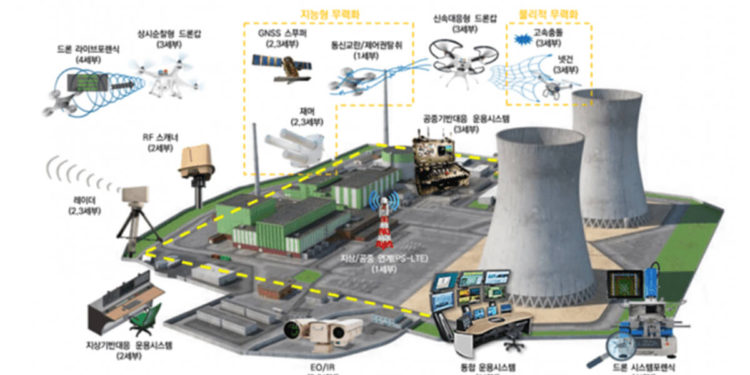The South Korean Ministry of Science and ICT (MSIT) announced that it would develop countermeasure technologies against illegal drone attacks. Recently, security threats and illegal activities using drones have significantly increased in response to the country’s fast-growing technological developments. As a result, MSIT shared it would develop and promote an integrated response system against illegal drones.
Moreover, the government would invest 42 billion won ($37.6 million) to the project, which would be completed by 2025. The Korea Atomic Energy Research Institute (KAERI) would head a consortium comprised of 23 private companies and research organizations. In particular, KAERI would enlist multiple public research institutes, including the Korea Aerospace Research Institute and defense company LIG Nex1. KAERI would also recruit 17 anti-drone companies and universities for the project.
Upgrading Anti-Drone Systems
MSIT’s primary goal is to establish an integrated drone response system that would detect and neutralize illegal autonomous drones. Aside from offering illegal drone identification functions, the response system would also provide drone analysis, neutralization, and accident investigation operations. With the response system, South Korea could prepare for potential harm to critical facilities, including nuclear reactor units and airports.
MSIT also shared that current defense precautions against illegal drones only employ ground-based technologies. As part of upgrading the country’s anti-drone security countermeasures, the consortium would establish aerial defense systems. To this end, the group would develop surveillance drones that recognize illegal counterparts over the next five years.
The patrol drones would subdue illegal ones by jamming radio connections, taking over their control systems, or utilizing GPS-spoofing devices. They could also neutralize illegal drones by employing physical disabling equipment, flinging nets, or using fast-responding drone shooters. Additionally, MSIT would collaborate with the Korean National Police Agency and the Ministry of Trade, Industry, and Energy. The government also allotted around 6.6 billion won ($5.9 million) to the project’s budget for this year.
“It is important to prepare an integrated solution that can comprehensively prepare for illegal drone activities,” said Kim Bong-Soo, a Research Policy Officer at MSIT. Kim also added that the KAERI consortium would play a vital role in securing technologies and preparing anti-illegal drone solutions. In addition to improving critical domestic facilities’ safety, the KAERI consortium would share its technological developments with the global market.







